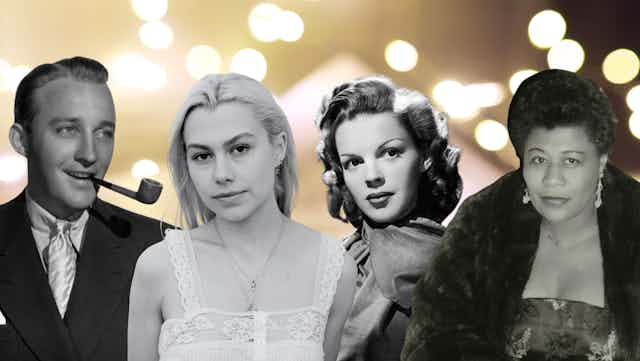Eighty years ago this week, Judy Garland walked into an MGM studio and recorded Have Yourself a Merry Little Christmas for the first time. It was written for the musical Meet Me in St Louis (1944), only part of which is set at Christmas – but no matter. Its music and lyrics by Hugh Martin have come to represent the epitome of the classic Christmas song.
Eighty-two years ago this week, the bombing of Pearl Harbor drew the US into the second world war. Sixteen million Americans signed up to the armed forces, and many American women responded to the Rosie the Riveter campaign by joining workplaces for the first time. Family life was profoundly changed: there was a sense of displacement, absence and loss.
Popular music responded with conventional war songs (see Praise the Lord and Pass the Ammunition by Frank Loesser of Guys and Dolls fame) but it was the Christmas song that best expressed the heartache.
Irving Berlin added White Christmas to the score of his Bing Crosby movie Holiday Inn in 1942. He’d drafted it a couple of years earlier but now its opening line that evoked snowy holidays “just like the ones I used to know” was the perfect sentiment to tug at the heartstrings of a nation receptive to the idea of a nostalgic past, rather than a fragile present.
A question of morale
A year later, Crosby recorded I’ll Be Home for Christmas, a number by Walter Kent and Kim Gannon that more explicitly addressed the zeitgeist.
It’s laid out in the form of a letter from a soldier writing home to his family. The strained optimism of the opening line (“I’ll be home for Christmas”) gives way to a shopping list of seasonal cliches (snow, mistletoe, presents on the tree) before the shattering final line (“if only in my dreams”) that addresses the truth: it was all unlikely to happen.
The sentiment was so on point that the BBC banned the song from broadcast, worrying that it might lower morale.
But it was Have Yourself a Merry Little Christmas that best tapped into the feeling of wartime winters. Ironically, Hugh Martin’s original lyric to the song was so drastic that there was no way it could be released to a nation in collective mourning. It read: “Have yourself a merry little Christmas, it may be your last. Next year we will all be living in the past.”
Garland and the director Vincente Minnelli agreed that she would seem like a monster if Garland’s character Esther sang those words to her much younger sister Tootie (Margaret O’Brien) in a moment of upset, so Martin tweaked them to: “Have yourself a merry little Christmas, make the yuletide gay. From now on our troubles will be miles away.”
And whereas the original said that “Faithful friends who are dear to us will be near to us no more”, the revised version became “once more”.
America needed the poignancy of a hopeful message delivered through tears (as in Garland’s performance in the movie), not defeatism. Yet the song’s final phrase expresses how close to the surface the separation of family was in November 1944, when the movie was released: “Someday soon we all will be together, if the fates allow. Until then we’ll have to muddle through somehow.”
Rewriting classics
Few would disagree that Judy Garland’s original performance of the song in Meet Me in St Louis is definitive. But 13 years later, Frank Sinatra requested a few tweaks to the words for his 1957 holiday album A Jolly Christmas.
When Sinatra released his album, Dwight D Eisenhower was in office. The president was a war hero, and his mantra was “pessimism never won any battle”.
Thus Sinatra’s musical version of a 1950s American Christmas was firmer, less poignant. For him, Martin replaced the line about “muddling through” with a new, neutral one: “Hang a shining star upon the highest bough.” He even changed “Someday soon we all will be together” to “Through the years we all will be together”, removing the equivocation of the future “someday”.
After Sinatra’s erasure of the emotive wartime spirit of the original, subsequent cover versions of the song often opted for jolly (Ella Fitzgerald, 1960), lush (The Carpenters, 1978) or dramatic (The Jackson 5, whose 1970 version almost sounds like a James Bond theme in places) tones.
But it’s striking that in the 21st century, several leading artists who are not at all associated with the classic American songbook returned to the sadder feel of the original. Indeed, Coldplay, Sam Smith and Phoebe Bridgers’ versions are almost bleaker than Garland’s – fragile music for a fragile world.
Professor Dominic Broomfield-McHugh will be giving a lecture on the Christmas classic Have Yourself a Merry Little Christmas at St Paul’s Church, London, December 6 at 18:00

Looking for something good? Cut through the noise with a carefully curated selection of the latest releases, live events and exhibitions, straight to your inbox every fortnight, on Fridays. Sign up here.

